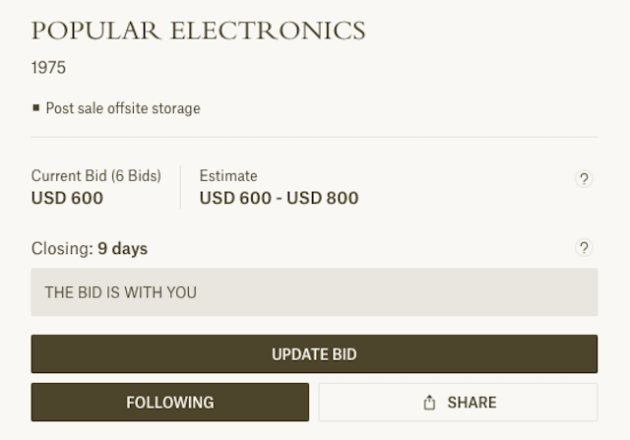GeekWire tried to win a piece of Microsoft and Paul Allen history at auction — here’s why we lost
There’s probably a magazine article out there somewhere about how to successfully bid on something at auction and come away a winner. Hopefully it’s not in a 1975 copy of Popular Electronics, because, well, I had a little trouble getting my hands on one of those … at auction.
In a bid to outbid other tech and computer history geeks this week, GeekWire gave me the company credit card and told me to try to win something from one of three Christie’s sales of items from Paul Allen’s collection of computers and other stuff.
I chose a set of 12 issues of Popular Electronics, dated January to December 1975, and featuring the issue that basically served as the inspiration for Allen and Bill Gates to launch Microsoft. The history was solidly geeky. Plus, GeekWire co-founder Todd Bishop, who has covered Microsoft for more than 20 years, was excited about the fact that the mags were once owned by Allen, and that the pre-sale estimate of $600 to $800 was within our budget.
I placed my bid. I reveled in having the top bid for about 48 hours. I imagined how I’d be a hero at the GeekWire offices, walking in with the box of magazines, acting like this. And then I called an expert for auction insights and advice to see how smart I was. And I was hit with a dose of reality.
“This is not gonna sell for $800,” said Rachel Kaminsky, a longtime international art dealer, gallery operator, auction expert and fine art fund manager. “Sorry!”

During a video chat from her New York home, three days before the end of the auction, Kaminsky pretty much put a match to my auction-winning magazine dream. She’d seen enough deep pockets and dashed hopes to know how these things work.
Kaminsky spent 11 years at Christie’s as head of old master paintings, and she specializes in pre-19th century European paintings. She knew of Allen as a “great collector,” but said he wasn’t somebody that she did a lot of business with because he didn’t seek out the paintings she specialized in. She did help broker the 2022 Christie’s sale of a $26.7 million Georgia O’Keefe painting that Allen previously owned, calling it an “absolutely fantastic, A++ O’Keefe.”
But Kaminsky, who laughed about having enough tech know-how to use her computer or iPad, admitted that she didn’t know much about the early days of Microsoft or computing/technology in general.
Maybe she didn’t know what 12 1975 issues of Popular Electronics are worth or who might be interested. I had hope! But there really was very little.

After registering with Christie’s on Sept. 3, I placed a $600 bid for the magazines to get ahead of five previous bidders. Each bid rose the price by $100. By Sept. 8 I had been outbid; by Tuesday the going price of $900 exceeded my budget and I couldn’t bid again; on Wednesday, 10 bids raised the price to $1,000.
By Thursday, when the auction ended, the magazines sold for $4,410 — only $4,409.25 more than the 75-cent cover price Allen presumably paid for a single famous issue in 1975.
In total, across three sales, the Christie’s auction of Allen items — including many that used to be on display at Seattle’s Living Computers: Museum + Labs, brought in $16.8 million. Allen’s estate says proceeds from all sales will go to charitable causes, in keeping with his wishes.
Kaminsky schooled me on some of the ins and outs of high-end auctions in general and online auctions in particular. Clicking on a computer is much different than being in a room, reading faces and reacting to the vibe of dollars being thrown around for someone else’s stuff.
“Most people don’t bid three days before the auction [ends],” Kaminsky said of the online protocol. “People who bid three days before the auction, either they’re novices or they don’t really care if they get it or not.”
With Allen’s name attached, even to a stack of old magazines, she expected a lot of people to care. Including people who view $800 or more as chump change.
“Because of Paul Allen’s incredible history in the world of computers, the fact he owned this, the provenance of it adds a huge amount of value to this,” Kaminsky said. “There are a lot of people in the world who have $800 to spend or more. In the tech industry, this is like lunch.”
Kaminsky said the people who really wanted the magazines, or any of the 120 or so other items available in the two online sales, would have been watching in the last five minutes of the auction, when the “real bidding” would take place.
She also figured people at all ends of the spectrum would be interested and bidding, from the geeky computer kid who thinks an item is super cool but has a limited amount of money, to somebody who’s got mid-level wealth and appreciates an interesting part of history, to the person who has unlimited funds and says, “You know what, I just want it at any price.”

But along the way I imagined the computer geeks, Allen fanboys, and ultra-rich types would be too distracted by other noteworthy items to pay any attention to GeekWire’s future stack of Popular Electronics issues. They could bid on these early Microsoft memos, I would tell them, or this mouse! Or go over to eBay and just grab the single magazine (not owned by Allen) that sparked the beginnings of Microsoft.
Again, before the auction ended, Kaminsky offered a dash of hope.
“At auction, sometimes things fall through the cracks. I’ve seen that happen as a seller, as an auctioneer, as a buyer,” she said. “You always just have to show up, because the one time you don’t, that’s when it falls through the cracks and somebody else got a bargain that you missed.”
My pockets never got any deeper — even with a GeekWire credit card in them — and the magazines ultimately went to the “somebody else” Kaminsky mentioned.
But next time you’ve got your eye on something at auction, whether it’s another piece of Paul Allen history or any random doo-dad, remember the priceless tips I’ve offered. And remember that you read it here first, not in a 1975 issue of Popular Mechanics.
Previously:
- Paul Allen estate sells remaining Living Computers artifacts and systems to museum near Atlanta
- Auction of Paul Allen items, including vintage computers, Einstein letter and more, brings in $10M
- Go back inside Seattle’s Living Computers, virtually, via 3D tour updated with links to auction items
- They gave machines to Living Computers for preservation, but museum’s closure is a bitter end

